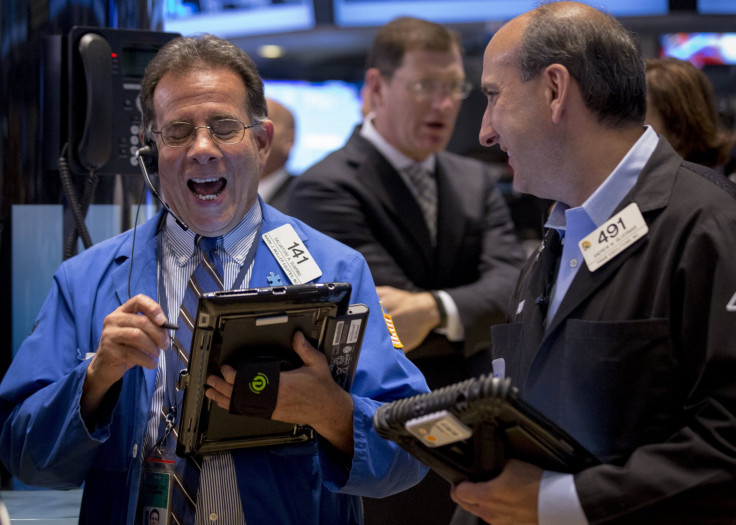Dow Jones Industrial Average Soars 250 Points As Intel Corporation (INTC) And Microsoft Corporation (MSFT) Jump 2%

U.S. stocks rebounded Wednesday, with the Dow Jones Industrial Average soaring 250 points, snapping four days of declines. All 10 sectors in the S&P 500 traded higher, led by gains from the materials, technology and financial sectors.
The Dow Jones Industrial Average (INDEXDJX:.DJI) soared 254.18 points, or 1.43 percent, to 18,018.22. The Standard & Poor’s 500 index (INDEXNASDAQ:.IXIC) added 25.50 points, or 1.23 percent, to 2,105.76. The Nasdaq composite (INDEXSP:.INX) gained 65.22 points, or 1.3 percent, to 5,078.73.
Technology led the Dow higher Wednesday, driven by a 2.8 percent gain from Intel Corporation (NASDAQ:INTC). Microsoft Corporation (NASDAQ:MSFT) and International Business Machines Corp. (NYSE:IBM) both rose 2 percent.
The S&P 500 financials sector jumped 1.7 percent, as Prudential Financial Inc. (NYSE:PRU) added 2.7 percent. Meanwhile, the S&P 500 materials sector gained nearly 1 percent, as Freeport-McMoRan Inc. (NYSE:FCX) and LyondellBasell Industries NV (NYSE:LYB) rose 3 percent and 2.5 percent, respectively.
Wednesday's gains helped push the Dow into positive territory for the year after sharp losses Friday pulled the Dow negative for 2015.
Government bond yields sold off and hit 2015 highs across the world, including Germany, the U.S., the U.K. and Japan. The yield on 10-year German government bunds broke above 1 percent overnight for the first time since September 2014 after long-term global inflation expectations rose, luring investors back into the equity market.
Inflation, or rising price levels for goods and services, can have two negative effects for bond investors. First, rising inflation can diminish portfolio returns over time. Second, the U.S. Federal Reserve can raise short-term interest rates if inflation expectations rise to reduce the demand for credit and help prevent the economy from overheating.
The sudden spike in global treasury yields could be seen as a reason for the Federal Reserve to delay its first interest rate hike in nearly a decade, Paul Ashworth, chief market economist at Capital Economics, said in a research note Wednesday. Most economists anticipate the Fed will lift rates in September.
Federal Reserve officials have been worried for some time that even a modest rise in U.S. interest rates could spark a massive sell-off in the bond market, and Ashworth says recent market moves will only have increased those fears. Since the Federal Open Market Committee’s last meeting on April 28-29, the 10-year U.S. treasury yield has jumped by more than 40 basis points.
However, the rise in yields also reflects the improving U.S. economic data. Data last week revealed U.S. employers created 280,000 jobs in May and the unemployment rate rose to 5.5 percent, the Labor Department said. Economists say the unemployment rate ticked higher for a good reason: More people are coming back into the U.S. labor force.
“We doubt that all Fed officials will view the bond sell-off as bad news. Even at nearly 2.5 percent, the 10-year Treasury yield is unusually low,” Ashworth said.
Wednesday’s trading session was quiet on the economic calendar. Total weekly mortgage application volume jumped 8.4 percent on a seasonally adjusted basis from the prior week, the Mortgage Bankers Association (MBA) said Wednesday.
The sharp increase in applications was likely due to fears that interest rates on mortgages will move higher soon. "Mortgage application volume rebounded strongly in the week following the Memorial Day holiday, indicating that the holiday had a larger impact on business activity than originally assumed,” Mike Fratantoni, MBA's Chief Economist, said in the report.
The average interest rate for 30-year fixed-rate mortgages rose to 4.17 percent, its highest level since November 2014, the Mortgage Bankers Association said.
Jessica Menton is a writer who covers business and the financial markets. News tips? Email me here. Follow me on Twitter @JessicaMenton.
© Copyright IBTimes 2025. All rights reserved.






















